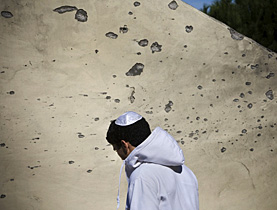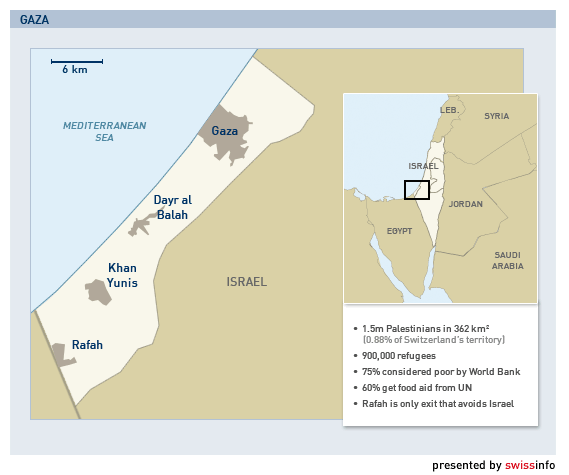
Gaza “not an issue” for most Israelis

The war in Gaza is senseless and will have desperate consequences, a Swiss social scientist who lives in Israel tells swissinfo.
Although most Israelis support their government’s action, Ernest Goldberger says there is a “painful” lack of interest among the population in the events in Gaza.
On Wednesday Israeli airstrikes and Hamas rockets resumed after a brief lull to allow food and fuel to reach Palestinian civilians in Gaza, where an Israeli warplane dropped leaflets urging residents to flee because of imminent attacks.
Even as the Israeli government tentatively welcomed a ceasefire proposal from Egypt and France, the Israeli military was instructed to continue its assault on Hamas.
Israel says it needs guarantees that any ceasefire will halt rocket fire and prevent Hamas from rearming, while Hamas demands that Gaza’s blockaded border crossings be opened.
Despite the reservations, the proposal could mark the first sign of a possible exit from 12 days of bloodshed in Gaza, accompanied by continued Hamas rocket fire on southern Israel.
Israeli strikes have killed at least 688 Palestinians since December 27, including around 350 civilians, among them 130 children, according to Palestinian officials.
swissinfo: Support for the war among the Israeli population is strong, according to the media. Is this true?
Ernest Goldberger: Unfortunately it is. Support is very noticeable. The public loves political leaders who walk and talk tough. This can be seen in the increase in popularity of Defence Minister Ehud Barak’s Labor Party since the start of the war.
swissinfo: So the war will be a factor in the general elections on February 10?
E.G.: Absolutely. The election is one of the goals of this war, but there are others. The Israeli government wants to teach the enemy a lesson and also restore the PLO [Palestine Liberation Organization] to power in Gaza.
Above all however they want to make amends for the Second Lebanon War in 2006 and once again demonstrate the deterrent potential of the Israeli army.
swissinfo: You live in Tel Aviv. What is the atmosphere like there? How are people experiencing the war?
E.G.: That is a very moving question. One comes across an unbelievable apathy. People don’t talk about [the war] and only take note of it on the news. It’s not an issue – the majority of people aren’t affected by it. For me, that’s painful to see.
Even the stock market has jumped more than ten per cent since the war began – a sign that it isn’t considered a significant event.
swissinfo: How do people react to pictures of bombed schools and the general misery and suffering in the Gaza Strip?
E.G.: The government learnt lessons from the Second Lebanon War and controls the flow of information. We simply don’t see these pictures – or only from a distance. Foreign journalists are not allowed into Gaza and are subject to very strict military censorship.
We can see these images on CNN and online, but many people don’t want to see them. They go along with the official government line: “We’re simply defending ourselves, combating terror, we have no other choice.” These are the soundbites one hears on loop and which the public gladly absorbs, settling their mind.
swissinfo: Rockets continue to be fired from Gaza into Israel. How should Israel defend its citizens?
E.G.: What Hamas is doing is reprehensible. This indiscriminate bombarding of civilians cannot be justified. Hamas’s main aims are to break the blockade and to take over the political leadership against Israel with a view to a future Palestinian state.
Neither side is showing any consideration for the civilian population – both in Israel and in Gaza. There was a six-month ceasefire but this collapsed [on December 19] because Israel hadn’t lifted the blockade and suffocation of Gaza and was not willing to talk to Hamas.
swissinfo: Do Israelis genuinely believe that Hamas, which is deeply rooted in Gazan society, can be eliminated?
E.G.: Most of the population don’t really believe so. But that’s not the main issue – it’s all about teaching the enemy a lesson and breaking them up.
But it won’t be possible to wipe out the spirit of Hamas – and even if that were to happen, history shows that people would find new ways of continuing the struggle.
swissinfo: Is there a danger that the war could create a further radicalisation and that Hamas could even be boosted?
E.G.: Certainly. Hamas is not popular, even among the Palestinians – it runs a form of dictatorship in Gaza in which any opposition is brutally suppressed. But this war has renewed Hamas’s status. People forget what it’s doing to its own people.
swissinfo: At the moment the chances of a lasting solution in the Middle East appear practically non-existent. What’s the next step?
E.G.: Without very, very strong external pressure – above all from the United States – I can’t see any hope for ending the conflict. One has hopes for the new US president and that the European Union finally takes a stand and intensifies the pressure.
swissinfo: How do you judge the past few days?
E.G.: I see the war as madness, a spiral of violence, a deeply painful feeling of helplessness and as a renewed expression of a developed society solving problems with violence.
It has consequences for the relationship with Israeli Arabs, who after all make up a fifth of the population. They are forced to look on as relatives die in Gaza on a daily basis. The war also has an effect on Israel’s reputation in the civilised world.
swissinfo: You describe yourself as an atypical Swiss Jew in Israel. Are you also an atypical Jew in Israel?
E.G.: I wouldn’t go that far. The peace movement isn’t dead. I’m in touch with many friends who share my views – but we’re definitely in the minority.
swissinfo-interview: Gaby Ochsenbein
Swiss humanitarian activities in the Gaza Strip have been seriously reduced and almost suspended due to ongoing fighting between the Israeli army and Hamas militants.
A medicine programme has been badly affected, said the Swiss Agency for Development and Cooperation (SDC) on Tuesday. A building belonging to an SDC-supported partner organisation was also damaged following the bombing of a nearby police station.
For several years Switzerland has provided humanitarian aid to the civilian population of the Gaza Strip and the West Bank including East Jerusalem. The SDC, which has an office in Jerusalem, gave SFr20 million ($18 million) to the Palestinians in 2007.
Its projects focus on improving the prospects for peace, better living conditions, promotion of viable institutions in the long-term, support for the United Nations Relief and Works Agency for Palestine Refugees in the Near East (UNRWA), the International Committee of the Red Cross (ICRC) and various Palestinian and international non-governmental organisations.
It provided SFr12 million in 2008 and intends to immediately release further financial support, added to the SFr4 million already earmarked for UNRWA and the ICRC.
1931: born in Basel.
Studied economics and sociology.
1991: emigrated to Israel.
2004: his book “Die Seele Israels – Ein Volk zwischen Traum, Wirklichkeit und Hoffnung” (The Soul of Israel – a people between dream, reality and hope) published by NZZ.
Goldberger lives in Tel Aviv with his wife, an Israeli from a Yemenite family, and his twin daughters.


In compliance with the JTI standards
More: SWI swissinfo.ch certified by the Journalism Trust Initiative


























You can find an overview of ongoing debates with our journalists here . Please join us!
If you want to start a conversation about a topic raised in this article or want to report factual errors, email us at english@swissinfo.ch.